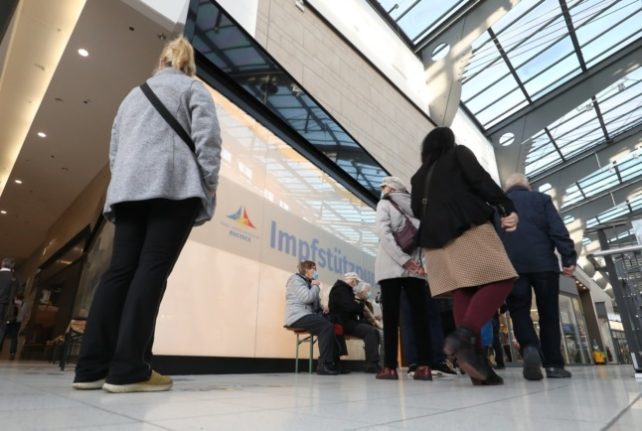The Covid situation has been deteriorating in Germany as the infection rate goes up, along with the number of deaths and the number of patients being admitted to intensive care.
According to German media site Business Insider, the federal and state health ministers (Conference of Health Ministers or GMK) will meet this Thursday and Friday to discuss the next steps.
Among other proposals, health ministers want to discuss tightening quarantine regulations for close contacts of people who have contracted Covid.
Furthermore – after nearly two years of pandemic – they are also to discuss better protection for elderly people in nursing homes. The proposals also highlight a broader booster campaign, more mobile vaccination teams in the community and comprehensive testing.
On Wednesday there were 20,398 Covid cases over the past 24 hours, according to the Robert Koch health institute, while another 194 people died.
The number of Covid patients in intensive care on Wednesday rose to 2,226 – up almost 26 percent on the previous week, according to Germany’s DIVI registry.
Here’s a look at some of the points in the draft paper ahead of the health ministers’ meeting:
Vaccinations: The health ministers will be discussing how to encourage people who are still vaccine-hesitant to get their Covid jab. They will also consider whether to reopen closed vaccination centres.
Booster vaccinations: The federal and state governments want booster vaccinations – especially in care facilities – to be offered at a faster pace by doctors, including family GPs. “To ensure the vaccination offer, supplementary state vaccination offers, in particular mobile vaccination teams, will be used if necessary,” says the draft paper.
The doctors’ union Marburger Bund also called for booster vaccinations to be offered more quickly. “We need to push the pace more on booster vaccinations,” said chairwoman Susanne Johna. “The health ministries of the states should now inform everyone over 70 by letter specifically about the possibility of booster vaccination,” she said. “You can’t just assume that people already know about it.”
Health Minister Jens Spahn earlier on Wednesday urged states to be proactive about the booster campaign.
READ ALSO: Germany seeing a ‘massive pandemic of the unvaccinated’
Information campaign: the Associations of Statutory Health Insurance Physicians in the states, as well as family doctors, are asked to actively inform people about the recommendation and the offer of booster vaccinations, the paper says. It goes on to say: “The federal government and the states will increasingly inform people about the possibility and benefits of taking up booster vaccinations as part of their public relations work and will also specifically approach certain vulnerable groups of people for this purpose, for example by writing to citizens over 70 years of age.”
That could even be reduced to the over 60s since Spahn has spoken out in favour of giving all the over 60s a booster jab as soon as possible.
Everyone offered a booster: In fact, health ministers are going a big step further – and essentially want to offer a top-up jab to everyone half a year after their last dose. They say: “In addition, within the framework of existing capacities and after medical assessment and decision, booster vaccinations can in principle be offered to all persons who wish to have them after the expiry of six months after completion of the first vaccination series.”
This plea for all vaccinated Germans to get a booster jab after six months is at odds with the nation’s STIKO vaccine commission, which at the moment is only recommending booster shots for the elderly and certain at-risk groups. However, STIKO announced on Tuesday that it was in the process of researching whether to issue a general recommendation for everyone to be given a top-up. This will depend on how far boosters are shown to be successful in limiting Covid infections, STIKO president Thomas Mertens told DPA.
READ ALSO:
- Who can get a Covid-19 booster shot in Germany?
- German vaccines panel considers recommending booster jabs for all
Covid-19 tests: According to the health ministers, there needs to be a larger focus on testing in care homes. “The federal government and the states say they will work towards ensuring that a sufficient range of tests is available in care facilities,” the draft paper says. “If this turns out to be insufficient, the Federation will examine an adjustment of the testing strategy and expansion of testing opportunities for staff and visitors in a timely manner and adapt the legal and financial framework and ensure sustainable funding.” Test concepts are to be reviewed “closely” by the supervisory authorities of the care facilities.
Rhineland Palatinate and Brandenburg have recently introduced mandatory daily tests for staff who work in care homes.
Costs: The federal government will continue to ensure that care facilities are reimbursed for the personnel and material costs of testing without burdening those in need of care, the paper says.
What else should I know?
Some states are now beginning to tighten their Covid measures, with pressure being piled on those eligible for vaccination who choose not to get it.
READ ALSO: How German states are tightening Covid rules for winter
Outgoing Chancellor Angela Merkel, said she was in favour of stricter curbs focussed on the unvaccinated.
“If the pandemic situations in hospitals worsens… then further restrictions for unvaccinated people are possible,” Merkel’s spokesman Steffen Seibert said on behalf of the chancellor.
Meanwhile, there are calls for a meeting between the caretaker government and the regional leaders of the 16 states to discuss a nationwide approach to the Covid surge.
Under Germany’s federal system, regional states have significant powers to decide their own Covid approach, at times leading to a confusing patchwork of regulations.



 Please whitelist us to continue reading.
Please whitelist us to continue reading.
Member comments